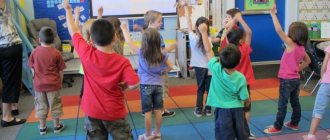The main tasks of instilling patriotism in younger schoolchildren
The goal of instilling patriotism in the younger category of schoolchildren is to develop the following qualities in younger schoolchildren:
- instilling in schoolchildren a sense of personal self-respect through virtuous actions, showing love and respect for family members, and respectful attitude towards the older generation;
- the formation of an objective idea of a person’s personal environment, the ability to present oneself correctly in society on the basis of accepted norms;
- through showing interest in one’s own family history, its personal traditions, respect for the country’s past, love for one’s small homeland is formed, as well as responsibility for its future.
These are the most basic qualities that are formed in schoolchildren in the process of patriotic education.
Patriotic education - definition
Some important features of instilling a sense of patriotism in primary school For children aged 7 to 10 years, instilling patriotism should be carried out in a playful way during visits to interesting events that are understandable to schoolchildren of this age. Among the main events aimed at developing patriotism among junior schoolchildren are themed classes, various business games, holiday meetings with veterans, personal conversations, exciting quizzes, collective competitions, creative activities, field trips, various trips, and familiarization with the important historical past. native land, unique traditions and customs of the Russian people.
A mandatory part of any school curriculum is military-patriotic education. Its main goal is to develop a feeling of love for the Motherland, to develop readiness for future service in the army - the upcoming defense of our country. Collective excursions to historical museums and thematic trips to places of military glory effectively cope with the priority task. All these events help familiarize schoolchildren with the general history of our country and its immense spirituality.
Excursion to the museum - a method of studying military history
parents » Culture of behavior and useful habits » Moral and patriotic education of preschoolers
Moral and patriotic education of preschoolers
Patriotic education of the younger generation is one of the most pressing tasks of our time. Huge changes have occurred in our country in recent years. This concerns moral values, attitudes towards the events of our history. Children have distorted ideas about patriotism, kindness, and generosity. People's attitude towards their homeland has also changed. If earlier we constantly heard and sang the anthems of our country, now they talk about it mostly negatively. Today, material values dominate over spiritual ones. However, the difficulties of the transition period should not become a reason for suspending patriotic education. The revival of spiritual and moral education is a step towards the revival of Russia.
It is moral and patriotic education that is one of the most important elements of public consciousness; this is the basis for the viability of any society and state, the continuity of generations. The formation of the personality of an older preschooler is impossible without instilling respect for spiritual values from childhood.
Moral and patriotic education can be called one of the most difficult areas for a number of reasons:
* features of preschool age,
* multidimensionality of the concept of “patriotism” in the modern world,
* lack of concept, theoretical and methodological developments (a characteristic feature of many studies is to address only certain aspects of the problem).
Fostering patriotic feelings in preschool children is one of the tasks of moral education, which includes nurturing love for loved ones, for kindergarten, for one’s native village and for one’s native country. Patriotic feelings are formed in the process of life and existence of a person located within a specific sociocultural environment. From the moment of birth, people instinctively, naturally and imperceptibly get used to their environment, the nature and culture of their country, to the way of life of their people.
It should be taken into account that a preschooler perceives the reality around him emotionally, therefore, patriotic feelings for his native village, for his native country are manifested in a feeling of admiration for his village, his country. Such feelings cannot arise after several classes. This is the result of long-term, systematic and targeted influence on the child. Raising children is carried out every second, in classes, events, holidays, in play and in everyday life. The work is structured in such a way that it passes through the heart of every kindergarten student. The love of a small preschool child for the Motherland begins with the attitude towards the closest people - father, mother, grandfather, grandmother, with love for his home, the street on which he lives, kindergarten, village.
V.V. Sukhomlinsky argued that childhood is an everyday discovery of the world and therefore it is necessary to make sure that it becomes, first of all, the knowledge of man and the Fatherland, their beauty and greatness.
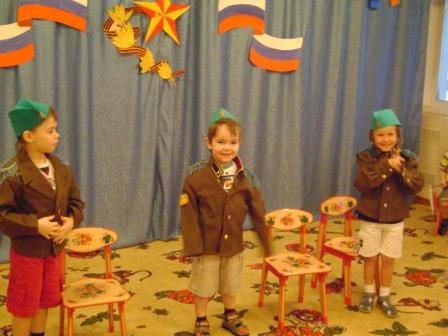
The education system is designed to ensure the education of Russian patriots, citizens of a legal democratic, social state who respect individual rights and freedoms, have high morality and show national and religious tolerance. The implementation of such a system is impossible without knowledge of the traditions of one’s homeland, one’s land.
Preschool age is the most important period in the formation of personality, when the prerequisites for civic qualities are laid, and children’s ideas about man, society and culture develop. The basic stage of developing love for the Motherland in children is their accumulation of social experience of life in their village, assimilation of the norms of behavior and relationships accepted in it, and introduction to the world of its culture.
The formation of love for the Motherland begins in early childhood, with a picture in the primer, a mother’s song, the corner where children live. V. A. Sukhomlinsky says: “It is impossible to awaken the feeling of the Motherland without perceiving and experiencing the world around us. Let the memories of a small corner of distant childhood remain in the baby’s heart for the rest of his life. Let the image of the great Motherland be associated with this corner.”
How to introduce children to moral and patriotic education?
1. Teach your child to take care of things, toys, and books. Explain to him that the work of many people is put into every thing. Treat books with care and promote interest in the content. Go to the library with your child and see how books are stored there. This game technique “like in a library” will help teach your child to treat books with care.
2. Preschoolers begin to show interest in the history of the country and region very early. If there are monuments in the city, organize excursions to them and tell them everything you know about how the memory of the dead is honored. You can make exciting trips around our country and around the world using the globe, maps and photographs.
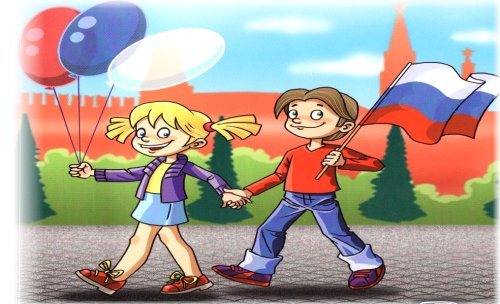
3.If the child has building materials, you can invite him to build a house. When the house is built, play housewarming with your child, help place dolls, bunnies, and bears. See if the house is solidly built, beautiful, and comfortable to live in.
4. Cultivate in your child a respectful and caring attitude towards bread. Watch how bread is delivered and unloaded. Tell us how bread is grown, how much work is put into it, together with your child, dry the leftover bread, make crackers.
5. Tell your child about your work: what you do, what benefits your work brings to people and the Motherland. Tell us what you like about your job.
6. When returning with your child from kindergarten, invite him to play the game “Who has noticed more interesting things?” “Let’s tell each other who has noticed more interesting things on our street. I see cars cleaning the street. What do you see? The game teaches observation skills and helps to form ideas about the environment. At home, invite your child to draw what they liked best.
7.Love for the Motherland is also love for the nature of the native land. Communication with nature makes a person more sensitive and responsive. In winter on skis, in summer on a bicycle or on foot, it is useful to go with your child to the forest to admire its beauty, the murmur of a stream, and the singing of birds. When cultivating love for their native land, it is important to teach a child to take care of nature and protect it.
How to raise a little patriot?
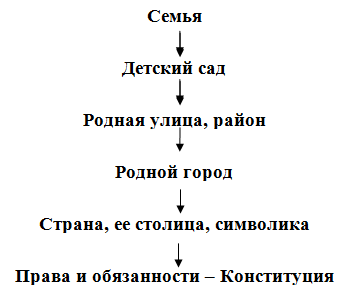
Contents of patriotic education of preschool children:
* introducing children to cultural heritage, holidays, traditions, folk applied arts, oral folk art, musical folklore, folk games.
* getting to know the family, its history, relatives, family traditions, drawing up a pedigree; with the kindergarten, its children, adults, games, toys, traditions; with the city, village, its history, coat of arms, traditions, outstanding citizens, villagers of the past and present, sights;
* conducting targeted observations of the condition of objects in different seasons of the year, organizing seasonal agricultural work in nature, sowing flowers, vegetables, planting bushes, trees, etc.;
* organization of creative, productive, playful activities for children, in which the child shows sympathy and care for people, plants, animals in different seasons of the year in connection with adaptation to new living conditions and daily, as necessary.
For more effective work on instilling patriotism in preschoolers, the following pedagogical conditions are necessary:
- heuristic environment in kindergarten and in the family,
- close cooperation between kindergarten teachers and family members,
— preparedness of teachers and parents to solve problems of instilling patriotism in children.
The heuristic environment is characterized by saturation with positive emotions and is a field for the child to demonstrate creativity, initiative, and independence.
Close cooperation between kindergarten teachers and family members is expressed in the establishment of trusting business contacts with the families of pupils; providing parents with a minimum of psychological and pedagogical information, teaching them how to communicate with their child; ensuring regular interaction between children, teachers and parents; involvement of family members in the pedagogical process; creating a subject-based developmental environment in kindergarten and family.
The preparedness of teachers to carry out the process of forming patriotism presupposes that they have an appropriate level of professional competence, professional skill, as well as the ability for self-regulation and self-discipline to solve assigned problems.
All of the above pedagogical conditions are interconnected and interdependent.
If in childhood a child experienced a feeling of pity for another person, joy from a good deed, pride in his parents, admiration from contact with a wonderful feat, he acquired an emotional experience.
In this way, paths will be built for associations of an emotional nature, and this is the basis, the foundation of deeper feelings, a condition for the full development of a person.
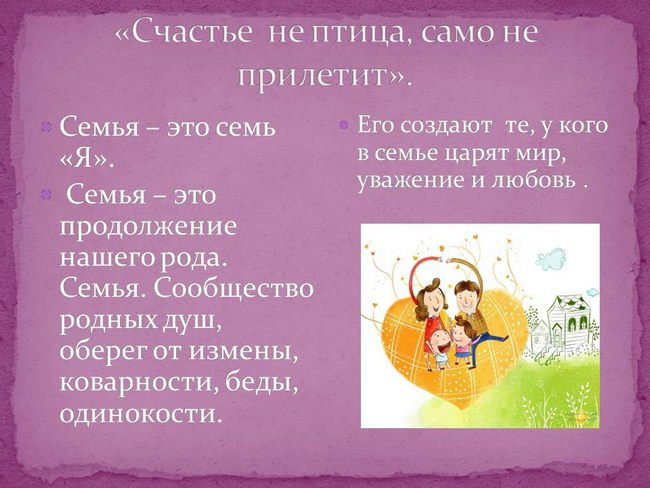
The upbringing of a little patriot begins with what is closest to him - his home, the street where he lives, kindergarten.
* Draw your child’s attention to the beauty of his hometown
* While walking, tell us what is on your street, talk about the meaning of each object.
* Give an idea of the work of public institutions: post office, store, library, etc. Observe the work of the employees of these institutions, note the value of their work.
* Together with your child, take part in the work of improving and landscaping your yard.
* Expand your own horizons
* Teach your child to correctly evaluate their actions and the actions of other people.
* Read him books about his homeland, its heroes, traditions, culture of his people
* Encourage your child for his desire to maintain order and exemplary behavior in public places.
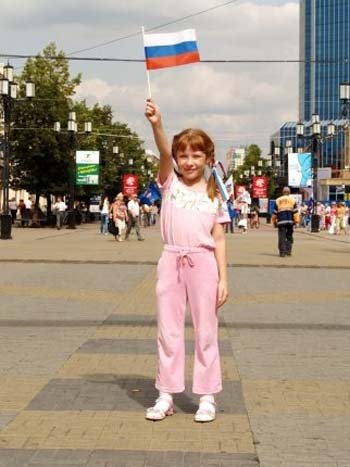
Formation of a sense of patriotism in children at an early age
As mentioned earlier, a huge role in instilling a sense of patriotism in a child belongs to his parents. Many moral qualities are developed in children in the early grades. Parents begin to lay the foundations of patriotism by awakening in the child a wonderful feeling of love for green trees, fragrant flowers, the surrounding nature, such a close and dear home. True love and devotion to the homeland begins in a child with manifestations of love for his own mother, father, grandmother, a pleasant feeling of being needed, a warm attitude and love, care with which he is surrounded.
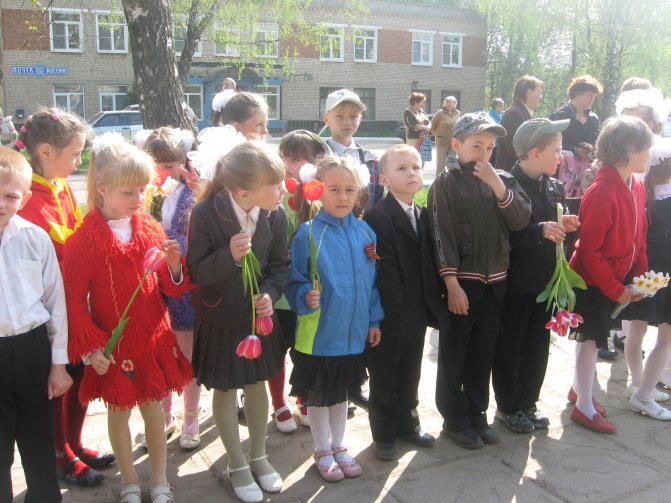
Patriotic education begins from the first days of school
The feeling of love for one’s own people begins to form from love for surrounding peers and adults.
General school programs
Patriotism is in fact the power that is capable of overthrowing all obstacles in its path and declaring to the whole world about our country with deep respect. That is why one of the priority areas of educational work in the classroom is moral and patriotic education, the main goals of which are as follows:
- the child's becoming a free citizen of his native country;
- gradual development of a sense of possible involvement in the destinies of the Fatherland;
- developing a high sense of pride in one’s own country and people.
Each teacher needs to take into account the main areas of work that is carried out in the lower grades in order to develop a sense of patriotism in them.
Directions of educational work
The school conducts educational work in the following areas:
- special class hours dedicated to conversations about the native land;
- collecting necessary materials and preparing speeches about their native lands;
- thematic excursions, collective implementation of simple design work;
- introduction of elementary history lessons;
- competitions for recitation of poetic verses, creative drawings, essays.
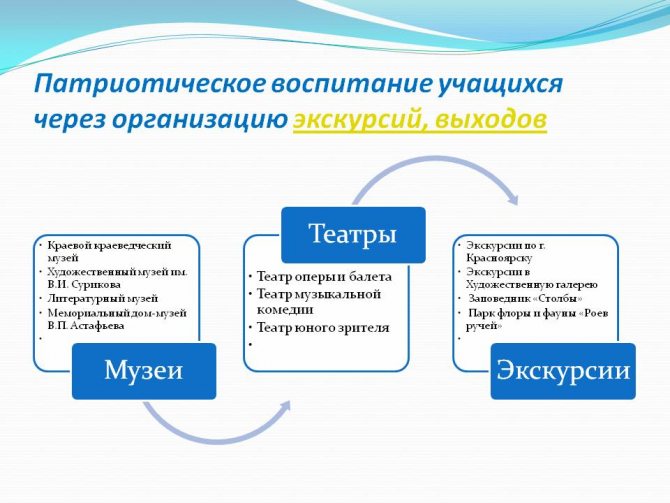
An important source of accumulation of moral qualities is in introducing schoolchildren to the world around them. In addition to the school base, which helps to form a sense of patriotism in children, parental education and their values, which they strive to pass on to their children, make a huge contribution to the development of this quality.







